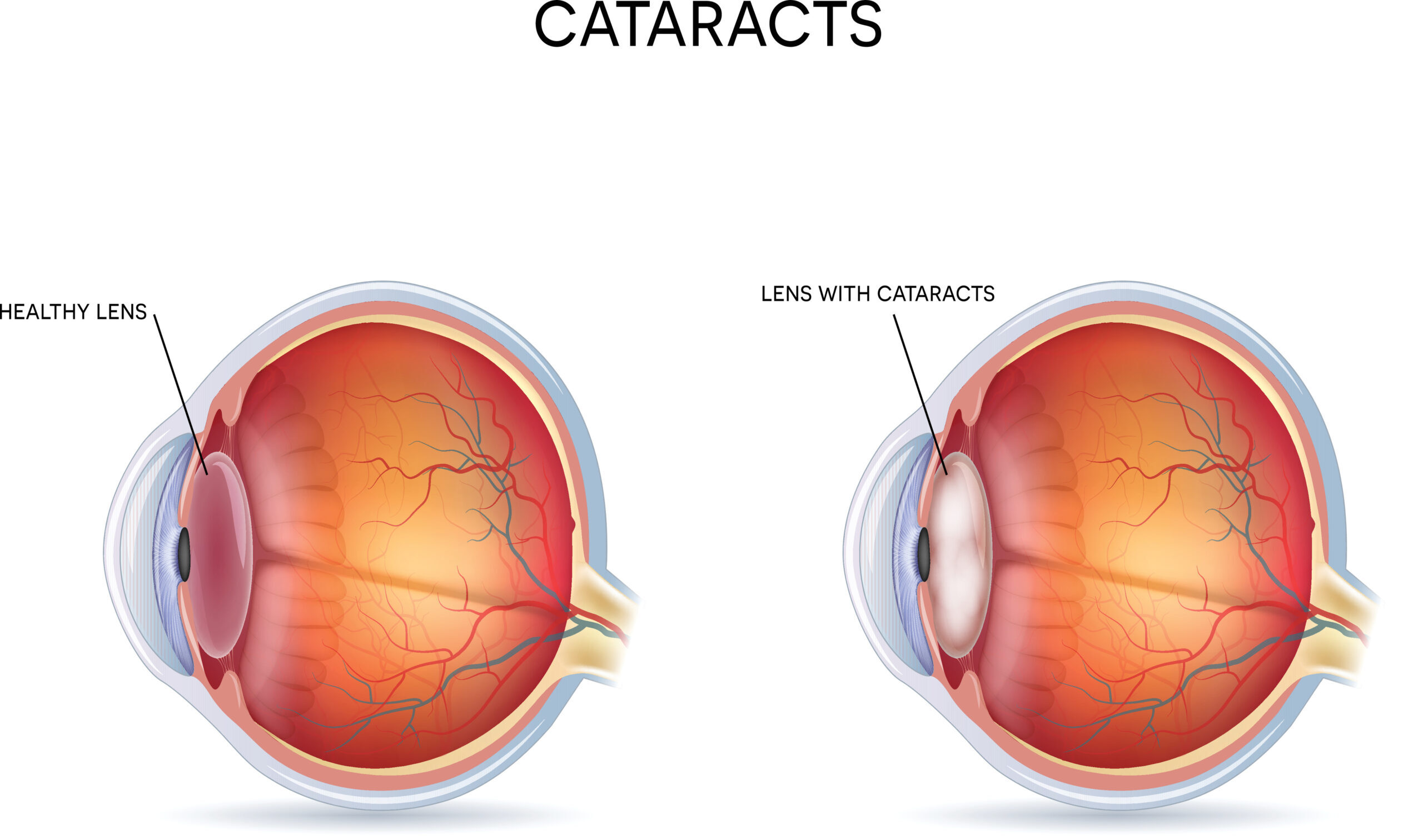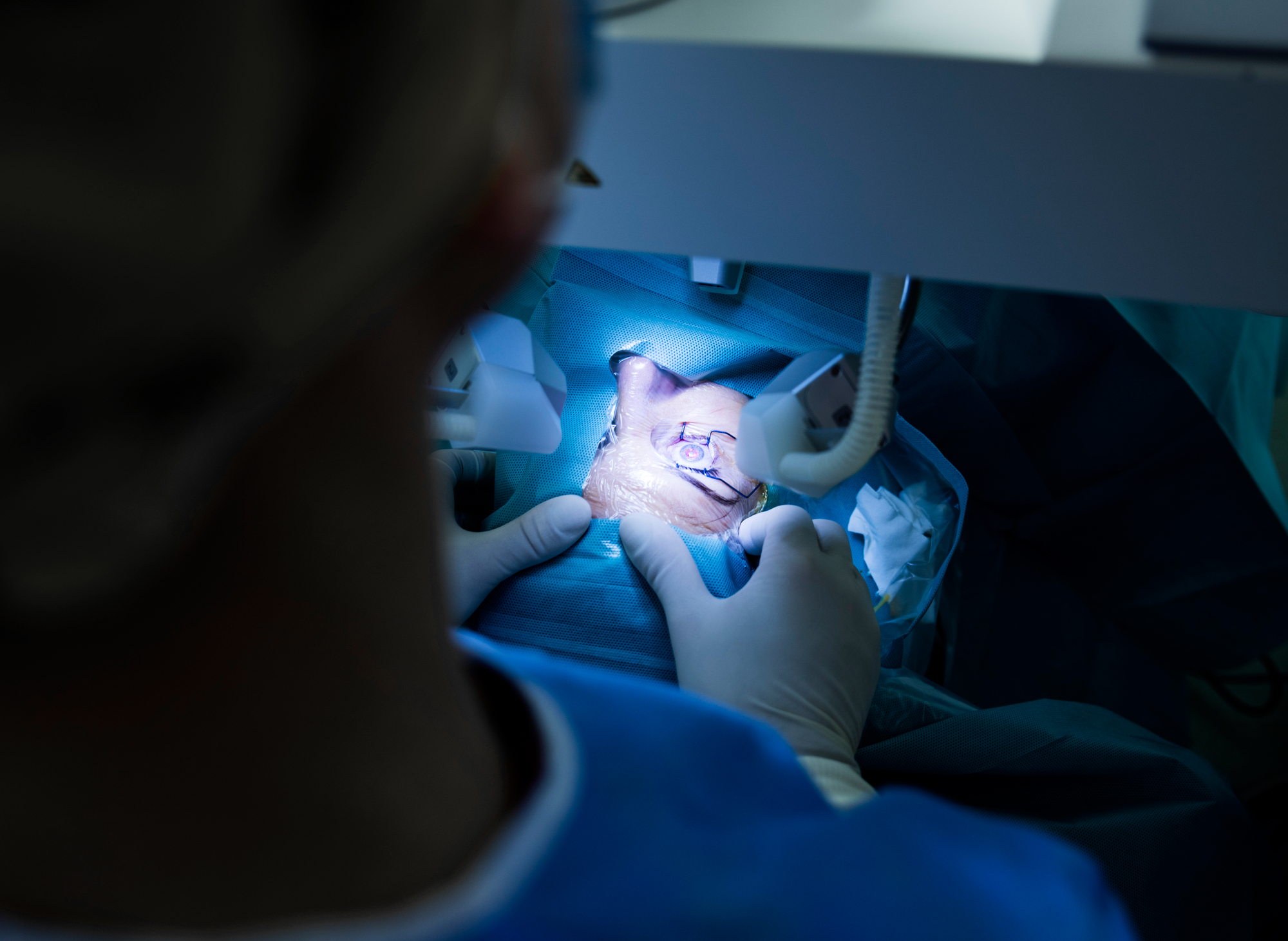Updated on October 21, 2024
Is Cataract Surgery Painful?


Vision Center is funded by our readers. We may earn commissions if you purchase something via one of our links.
A cataract is a cloudy area that develops in the eye's lens, causing visual impairment. Cataract surgery is the only effective solution to restore clear and correct vision.
This outpatient procedure involves the removal of the cataract by an eye doctor. Afterward, they will place an artificial lens or intraocular lens.

Does Cataract Surgery Hurt?
You’ll usually have little or no discomfort or pain during a cataract operation. Your doctors will take these steps before and after the surgery to ensure you don’t experience any pain:
- Pre-operative anesthesia — Before the surgery, your doctors will apply anesthetic eye drops to desensitize your eyes.
- Additional medication — In some cases, you may receive extra medicine intravenously during the surgery to ensure comfort.
- Continuous monitoring — Your cataract surgeon monitors your condition during the surgery to address potential discomfort or pain.
- Medication effects — The medications your doctors administer before and after the surgery may lead to temporary memory loss or difficulty recalling the details of the procedure, even though you remain awake throughout.
- Post-operative pain relief — You can use over-the-counter pain medication post-op as your eye surgeon recommends to alleviate discomfort or pain.
What Happens During Cataract Surgery?
The eye surgeon uses tiny tools to cut into your eye, break up the lens, and extract the cataract. Then, they set the new artificial lens into your eye.
Cataract surgery lasts approximately one hour. Following the procedure, you must rest in a recovery spot outside the operating room for a short time. Before you leave, a medical team will check to ensure you have no eye issues.
After surgery, your eye may feel slightly itchy or uncomfortable. It may also feel sensitive to light and touch.

Healing and Recovery Tips for Cataract Surgery
For a quick, safe, pain-free cataract surgery recovery, avoid doing the following after your operation:
- Driving on the first day
- Any strenuous activity or heavy lifting
- Bending over immediately, putting extra pressure on the eye
- Sneezing or vomiting
- Walking around
- Bumping into doors or other objects
- Swimming or using a hot tub
- Exposing your eyes to irritants during the first few weeks (dust, dirt, pollen, and wind)
- Rubbing your eyes
For the most effective cataract surgery recovery, follow your eye doctor’s detailed instructions on eye care following the procedure. Usually, they give these instructions on the day of surgery.
How Long Does it Take to Recover From Cataract Surgery?
Most people heal in eight weeks following cataract surgery. Your doctor will arrange checkups to ensure that your eye is healing properly.
Your vision may be blurry initially while your eye recovers. Some may notice that colors seem brighter following eye surgery because the artificial lens is clear.
Your natural lens may also have a yellow or brown tint from the cataract. Once your eye fully heals, you may require a new prescription for glasses or contact lenses.
Listen In Q&A Format
Is Cataract Surgery Painful?
Vision Center Podcast
Risks of Cataract Surgery
The risk of severe complications from cataract surgery is very low. However, there are still a few, including:
- Bleeding or infection
- Inflammation
- Swelling in the eye
- Retinal detachment
- Glaucoma
- Vision loss
Your doctor will discuss these risks before surgery and provide proper post-operative care to minimize them. Make sure to follow all instructions for a successful recovery.
Side Effects of Cataract Surgery
This type of eye surgery is one of the most common, effective, and safe surgeries in the United States. But, like with any surgery, there are risks.
Potential risks of cataract surgery include:
- Swelling, bleeding, or infections
- Vision loss or double vision
- Unusual changes in eye pressure
- Retinal detachment
- Secondary cataract (posterior capsule opacity)
Your eye doctor can treat these side effects if they catch them early. So, attend all your checkups and speak to your doctor if you notice anything unusual with your eyes or vision.
Secondary Cataract
Following cataract surgery, you might develop a secondary cataract or posterior capsule opacification. But despite the name, secondary cataracts aren’t cataracts.
Secondary cataracts occur when a cloudy lens develops on the eye capsule. They can occur weeks, months, or even years following cataract removal. Laser cataract surgery can fix them.

Summary
Cataract surgery is a safe and effective procedure to improve your vision. Most people don't experience any pain during the surgery. However, following your doctor's instructions carefully during recovery is essential to reduce the risk of infection or other complications.
In this article
7 sources cited
Updated on October 21, 2024
Updated on October 21, 2024
About Our Contributors
Ellie is a full-time freelance writer with a diverse portfolio in the medical field, including a focus on optometry. She crafts content in areas such as dentistry, addiction, mental health, and eye care. Her mission is to produce authoritative and research-backed optometry content, guiding readers to take care of their eyesight and seek necessary treatments.
Dr. Melody Huang is an optometrist and freelance health writer with a passion for educating people about eye health. With her unique blend of clinical expertise and writing skills, Dr. Huang seeks to guide individuals towards healthier and happier lives. Her interests extend to Eastern medicine and integrative healthcare approaches. Outside of work, she enjoys exploring new skincare products, experimenting with food recipes, and spending time with her adopted cats.

